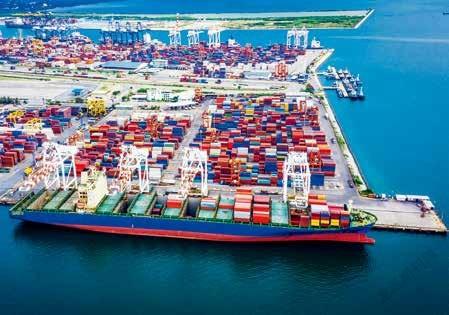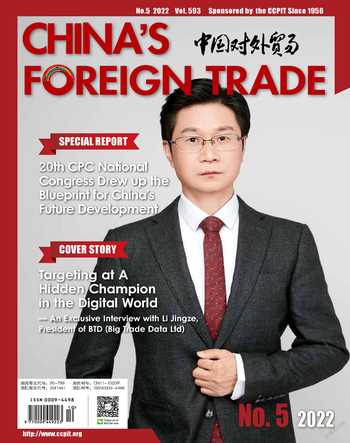As Shipping Costs“Dive”,It Is Imperative to Improve the Layout of Industrial Chain
By Ada Wang

Many people have noticed that global shipping prices have recently dropped to a new low across the year. Last year, international shipping, where it was “hard to find a box” and where prices were “soaring”, has suddenly cooled down this year.
Thanks to the obvious cost advantage, the global shipping volume at present accounts for more than 90% of the total trade volume, while container shipping, as one of the most important shipping modes, accounts for more than 80% of the maritime trade volume, which has a great impact on global trade.
Weak overseas demand
As of mid-September, the latest comprehensive freight rate index of Shanghai export containers released by the Shanghai Shipping Exchange was 2,562.12 points, down 10% from the previous period, which has been falling for 13 consecutive weeks. In addition, Drewrys World Container Freight Index (WCI) has been declining for 28 consecutive weeks, and the Baltic Dry Bulk Freight Index is also at the lowest level in the last two years.
According to the supply chain, at present, there are no longer queues of ships waiting to berth in world-famous ports such as Los Angeles, Boracay Island and Rotterdam. As of August 29th this year, there were 50,176 containers in the port of Los Angeles, while in late November last year, this number was as high as 90,397. On that day, only eight container ships were waiting at sea to call at the port near Southern California, compared with 48 at the same time last year.
Since the beginning of this year, the global container transportation market has generally sustained the market since the second half of last year, and the container shipping price has started to fluctuate since reaching its peak at the beginning of this year. In particular, due to the superimposed influence of high inflation rates in Europe and America, geopolitical conflicts in some regions, and the continuous spread of the pandemic, the global shipping market demand has shrunk dramatically. In addition, the imbalance between the international transport capacity allocation and the decrease in orders in the shipbuilding market have also had a certain impact on shipping prices.
The results of a questionnaire released by the China Council for the Promotion of International Trade show that the vast majority of foreign trade enterprises believe that they are facing the difficulty of a reduction in orders at present. Chinas manufacturing purchasing managers index (PMI) in August was 49.4%, which was 0.4 percentage points higher than that in July, but was still lower than the threshold, indicating that market demand is still weak. As extreme weather such as high temperatures and droughts are alleviated, the PMI is expected to pick up and improve, but the traditional overseas market has entered the end of restocking. In the fourth quarter, the high probability of external demand will remain weak, such that the overall growth rate of foreign trade may be lowered.

Li Mingyang, General Manager of Zhongshan Le Tu, said that this years orders were significantly less. On the one hand, some customersorders were dispersed among factories in other countries; on the other hand, consumer sentiment in the U.S. market was sluggish. Merchants mainly cleared their stock and were cautious about placing new orders. In addition, orders from European customers have also decreased a lot. In line with the current situation, it is estimated that the export volume of Chinas household electrical appliance industry will decline by about 10-30% this year.
However, Liang Huiqiang, Vice Chairman of Galanz Group and president of Whirlpool (China), said that the fall in international shipping prices has had a certain positive impact on home appliance exports, which can bear part of the cost pressure, especially when overseas market demand is weak in the second half of the year.
Price wars should be avoided
Some overseas media outlets have pointed out that due to many uncertainties in the international political and economic environment, shipping charges are likely to fall further from the rest of this year into next year. Kang Shuchun, CEO of Shipping China, believes that although the current shipping freight rate has plummeted, it is still slightly higher than the levels before the pandemic. Considering the current high global inflation rate, soaring oil prices, rising prices and other factors, the current freight rate remains within a reasonable range. However, judging from the current global economic environment, the downward trend in ocean freight is certain, but it is difficult to determine to what extent and when it will fall.
Xu Kai, Chief Information Officer of the Shanghai International Shipping Institute, believes that the abnormally high ocean freight rate last year was abnormal, while this years plunge is even more abnormal, which could be caused by shipping companies overreacting to market changes. He said that many liner companies have launched new container ships this year, and the turnover capacity is abundant, but the global demand for shipping booking is shrinking. In order to maintain the cargo loading rate of liners, shipping companies are trying to leverage freight to incite demand. However, the essence of the sluggish transportation demand in the market is the shrinking trade demand. This price reduction strategy will not bring any new demand, and will instead lead to vicious competition and disrupt the order of the shipping market.
“The moderate drop in international shipping costs is reasonable, but a continuous plunge is not conducive to the normal development of the whole market,” said Xu Kai when elaborating on his belief that the future ocean freight rate will not fall and will stabilize at a level below that of 2019, and that a more rational range to return to would be a level slightly higher than or close to that of 2019. Xu Kai revealed that at the beginning of the year, many shippers signed long-term agreement prices with shipping logistics companies in order to avoid a recurrence in the problem of hardto-find containers. However, spot freight in the market is currently far lower than the signed price. If domestic shipping logistics enterprises blindly follow these price reductions, it will not only harm the interests of shippers, but will also be detrimental to long-term cooperation, and the price reductions will also not bring about an increase in transportation demand. “It is better to improve the service level or develop new businesses, such as express shipping and cargo flow collection, than to wage price wars.”
Xu Kai also said that the “hard to find one box” situation previously seen by export enterprises will definitely not happen again, but this does not mean that it will send a good signal of profitability to the manufacturing industry. Among the key factors that affect the profits of enterprises, freight accounts for a very small proportion, usually within 1% of the value of container goods. For domestic export enterprises, Xu Kai believes that the more important matter is international competitiveness and the sales volume of goods, due to the fact that the economic recession and inflation in Europe and the U.S. have intensified. At the same time, the issue of overbooked goods which occurred over the last year will take some time to digest, and the decline in purchasing power will continue for some time. “In order to solve this pain point, we should first strengthen regional integration, improve the transnational management capability of Chinas supply chain logistics, and get through the sticking points of the supply chain. Second, it is necessary to cultivate more excellent Chinese-funded multinational enterprises and brands, improve the product design and innovative R&D capabilities of manufacturing industries, so that China can get rid of the label of ‘the worlds factory and promote high-quality products made by Chinas intelligence to attract more international consumer demand,” Xu Kai said.
In order to enhance the resilience and stability of global industrial chains and supply chains, on September 19, 2022, the Peoples Republic of China, the Republic of Chile, the Republic of Cuba, the Republic of Indonesia, the Islamic Republic of Pakistan, and the Republic of Serbia jointly proposed the Initiative of International Cooperation on Resilient and Stable Industrial and Supply Chains, with support from the Republic of Argentina. There are two points made therein which relate to international logistics. One is to promote logistics infrastructure and make an effort to address choke points in current logistics and transportation processes. The second is to endeavor to reduce costs and increase the quality and efficiency of logistics and to strive to facilitate customs clearance at ports of entry, so as to ensure the efficient operation of supply chains.
Nan Zhou, Secretary-General of the Household Appliances Branch of the China Chamber of Commerce for Import and Export of Machinery and Electronics Products, believes that for foreign trade enterprises, although the rise and fall in sea freight should be paid attention to, the urgent tasks are to continue to make full use of policy dividends, reduce costs and increase efficiency with a better supply chain layout and market expansion, and enhance competitiveness with more advantageous products.
- China’s foreign Trade的其它文章
- The Development of Foreign Trade in China over Last Decade:Higher-level Opening-up to the Outside World
- New Changes in Travel:Past Visitors Are Become Today’s Experiencers
- China’s Livestreaming Enters A New Phase of Development
- The Pension Industry Calls for New Models and Ecology
- Digital Technology Promotes China-foreign Trade in Agricultural Services
- China Manufacture“Prepares”for World Cup

